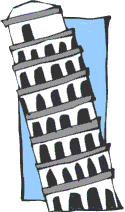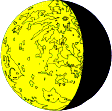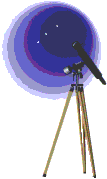The Wrangler
by John Hudson Tiner
As a musician, Vincenzo Galilei barely made enough money to support his
family. So when it came time for his son, Galileo, to go to college, Vincenzo
insisted that the boy study medicine. "Study to be a doctor," the father
said. "Doctors make good money."
Galileo liked the idea of college, but he did not like the way medicine
was taught at the University of Pisa where he attended. He explained to his
father, "The professors stand before the classes and read from books written
by ancient Greek writers. The discoveries of modern scientists such as Copernicus
are ignored."
"You must learn this to become a doctor," his father pointed out.
Galileo sighed, "It is very trying to sit and listen while someone else
reads from a book. Aristotle and Galen lived long ago, yet nobody questions
their books or puts their statements to the test."
Students at Pisa began the day by going to chapel. One morning Galileo
knelt and whispered his prayers in the dark chapel. He arose to watch a lamplighter
light the candles in a lamp, hanging thirty feet from the high ceiling.
 Lighting the candles caused the lamp to move in a slow back and forth motion.
As its motions died down, it seemed to make a small swing in the same time
period as a large one. Galileo returned to his room to try other pendulums.
He discovered that only by making the string longer could he lengthen the
time needed to make one back-and-forth swing.
Lighting the candles caused the lamp to move in a slow back and forth motion.
As its motions died down, it seemed to make a small swing in the same time
period as a large one. Galileo returned to his room to try other pendulums.
He discovered that only by making the string longer could he lengthen the
time needed to make one back-and-forth swing.
The ancient Greeks had not mentioned this discovery in any of their books.
Galileo began to question what the ancient books taught. He asked many questions.
"Look it up in Aristotle," his teachers told him. Galileo often loudly
disagreed with the answers in Aristotle's books. Students and professors
gave him the nickname "The Wrangler."
Aristotle claimed that heavy objects fall more rapidly than light ones.
A ball ten times as heavy as a lighter one would fall ten times faster.
Teachers at Pisa repeated this claim. A rumor sprang up that Galileo embarrassed
the entire Pisa faculty by dropping different size iron balls from the tower
of Pisa. Both the heavy and the light iron balls that Galileo dropped struck
the ground at the same time. Aristotle was wrong!
The professors, furious that a mere 18-year-old had shown how utterly
wrong they were, plotted for revenge. The chance came when Galileo, still
in need of money, asked for a scholarship. "No!" the professor cried. "If
Galileo wishes to prove Aristotle wrong, then he must do it with his own money!"
They denied Galileo the scholarship and made his life so miserable that
he left the University in 1585 without a medical degree. He moved to the
University of Padua--where he fared even worse.
Galileo learned of a "magnifying tube" invented by a lens grinder named
Hans Lippershey of Holland. The magnifying tube, or telescope, had the power
to make distant things appear near at hand. Galileo instantly saw that the
telescope could be used to study the heavens. He made a small telescope and
turned it to the moon. He discovered mountains, craters, plains, and deep
valleys. The moon was as rocky and uneven as the earth itself. Aristotle
had written that the heavens were perfect; the moon was a smooth globe.
 "No!" the scientists lashed out at Galileo. Jealous professors tried to
discredit him. They said, "Galileo is trying to prove the Bible is wrong."
The charge was groundless. Galileo had studied both the Bible and the heavens.
He found no disagreement in them. His argument was with Aristotle and those
scientists who blindly followed him. Galileo charged that Aristotle had made
mistakes, not the prophets of God.
"No!" the scientists lashed out at Galileo. Jealous professors tried to
discredit him. They said, "Galileo is trying to prove the Bible is wrong."
The charge was groundless. Galileo had studied both the Bible and the heavens.
He found no disagreement in them. His argument was with Aristotle and those
scientists who blindly followed him. Galileo charged that Aristotle had made
mistakes, not the prophets of God.
Galileo's study of the heavens made his faith in God stronger. He said,
"The Holy Scriptures are intended to teach men how to go to heaven, not how
the heavens go." The scientists and teachers refused to look through his
telescope. They argued "Aristotle tells nothing of them. They must be the
fault of Galileo's glass."
Galileo wrote a book about his discoveries. He called it The Starry Messenger. The professors
banded together and forced Galileo to stop publishing his books for many years.
Students, however, enjoyed Galileo's lectures. He had to move his classes
outside for more room. Teachers who taught by reading from old books found
empty seats!
 Galileo said, "I have offered a thousand times to show the leading philosophers
my studies. They will not consent to look at the planets or moon through
the telescope. They close their eyes to the light of truth!" Galileo spent
the last part of his life under house arrest. He used his time to meet with
friends and to train students. He wrote about his discoveries, although the
book was banned.
Galileo said, "I have offered a thousand times to show the leading philosophers
my studies. They will not consent to look at the planets or moon through
the telescope. They close their eyes to the light of truth!" Galileo spent
the last part of his life under house arrest. He used his time to meet with
friends and to train students. He wrote about his discoveries, although the
book was banned.
Galileo planted the seeds of doubt about Aristotle and the other Greek
philosophers who had a strangle hold on scientific thought. Galileo's stubborn
insistence upon experiments and careful observations blossomed into a new
spirit of discovery.
Galileo was deeply religious. He had even written a book on religious
matters. He believed that none of his theories dishonored any of the facts
in the Bible. His faith in God grew stronger, not weaker, because his telescope
showed such a marvelous universe. The heavens do declare the glory of God!
Back to Contents Does God Exist?, JanFeb03.
 Lighting the candles caused the lamp to move in a slow back and forth motion.
As its motions died down, it seemed to make a small swing in the same time
period as a large one. Galileo returned to his room to try other pendulums.
He discovered that only by making the string longer could he lengthen the
time needed to make one back-and-forth swing.
Lighting the candles caused the lamp to move in a slow back and forth motion.
As its motions died down, it seemed to make a small swing in the same time
period as a large one. Galileo returned to his room to try other pendulums.
He discovered that only by making the string longer could he lengthen the
time needed to make one back-and-forth swing. "No!" the scientists lashed out at Galileo. Jealous professors tried to
discredit him. They said, "Galileo is trying to prove the Bible is wrong."
The charge was groundless. Galileo had studied both the Bible and the heavens.
He found no disagreement in them. His argument was with Aristotle and those
scientists who blindly followed him. Galileo charged that Aristotle had made
mistakes, not the prophets of God.
"No!" the scientists lashed out at Galileo. Jealous professors tried to
discredit him. They said, "Galileo is trying to prove the Bible is wrong."
The charge was groundless. Galileo had studied both the Bible and the heavens.
He found no disagreement in them. His argument was with Aristotle and those
scientists who blindly followed him. Galileo charged that Aristotle had made
mistakes, not the prophets of God. Galileo said, "I have offered a thousand times to show the leading philosophers
my studies. They will not consent to look at the planets or moon through
the telescope. They close their eyes to the light of truth!" Galileo spent
the last part of his life under house arrest. He used his time to meet with
friends and to train students. He wrote about his discoveries, although the
book was banned.
Galileo said, "I have offered a thousand times to show the leading philosophers
my studies. They will not consent to look at the planets or moon through
the telescope. They close their eyes to the light of truth!" Galileo spent
the last part of his life under house arrest. He used his time to meet with
friends and to train students. He wrote about his discoveries, although the
book was banned.